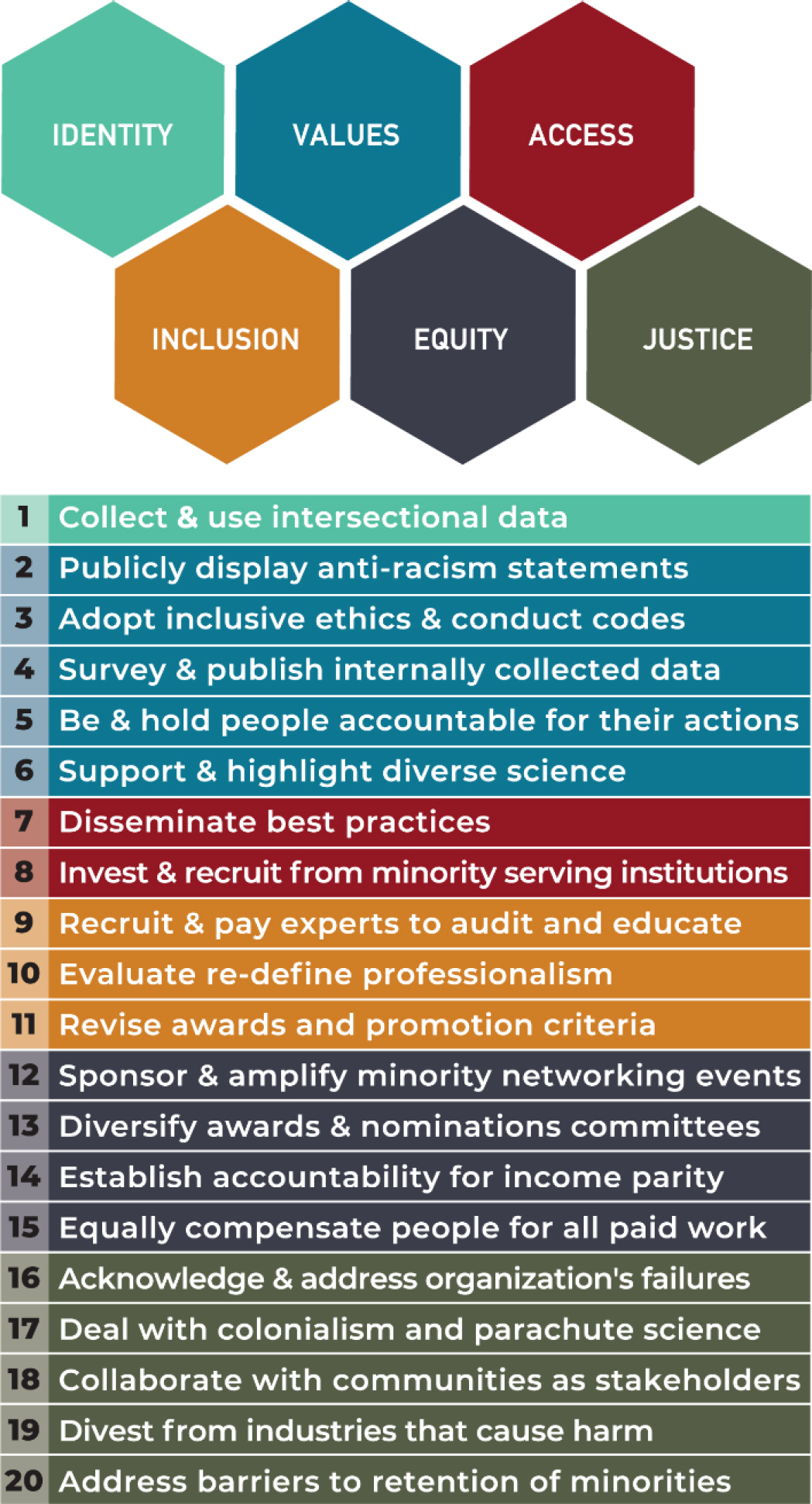How the Paleoclimate Community Can Better Engage on BAJEDI Issues
Aradhna Tripati, University of California, Los Angeles, convened an asynchronous session across the three days of the workshop that served as a dedicated space for participants to reflect on belonging, accessibility, justice, equity, diversity, and inclusion (BAJEDI) in the fields of paleoceanography and paleoclimatology. These topics were also raised throughout the other workshop sessions. With respect to gender and racial diversity, the geoscience field has less representation than other STEM [science, technology, engineering, and mathematics] fields, although data show the positive impacts of diversity for scientific discovery (Hofstra et al., 2020). Over the past 20 years, there have been improvements at the geosciences graduate student and faculty level in terms of gender (Ranganathan et al., 2021) that have predominantly benefited white women. People of color continue to be underrepresented as geoscience Ph.Ds. and tenure-track faculty (Bernard and Cooperdock, 2018). There are many ways in which the playing field is still not level in the geosciences, from mentoring and access to research facilities, to reference letters and service invitations (Berhe et al., 2020; Canetto et al., 2012; Dutt et al., 2016; Ford et al., 2018; Lerback and Hanson, 2017; Patat, 2016).
Tripati discussed these data and highlighted a set of mandates for the geoscience community to move beyond BAJEDI engagement to change with actionable plans: those include No Time for Silence,6 endorsed by professional societies and over 14,000 geoscientists; the Call for a Robust Anti-Racism Plan for The Geosciences7; and President Biden’s “Executive Order On Advancing Racial Equity and Support for Underserved Communities Through the Federal Government.”8
___________________
6 See https://notimeforsilence.org.
7 See https://www.change.org/p/geoscientists-call-for-a-robust-anti-racism-plan-forthe-geosciences.
8 See https://www.whitehouse.gov/briefing-room/presidential-actions/2021/01/20/executive-order-advancing-racial-equity-and-support-for-underserved-communitiesthrough-the-federal-government.
Student and Postdoc Diversity and Inclusion
Several workshop participants identified a lack of emphasis on retention, a lack of resources, and feelings of isolation as major challenges for students and postdocs. Proposed solutions included creating communities through structures, such as cohorts, networks, and centers. Additional challenges mentioned for student and postdoc diversity and inclusion included a lack of value on BAJEDI in education, training, and work settings; metrics; accountability; and unhealthy power dynamics. To address these challenges, workshop participants suggested various actions for consideration, including valuing, supporting, and compensating BAJEDI work; creating accountability processes; and requiring, incentivizing, and facilitating equity trainings, advocacy, and participation more broadly.
Faculty Diversity and Inclusion
Challenges specifically identified by workshop participants for faculty included lack of support, accountability, participation, accommodations, and feelings of burnout. Suggested solutions included the creation of accommodation processes, such as paid family and sick leave, dependent care, and twice-a-year deadlines. They also suggested specific accountability processes, such as grant reports, adherence to codes of conduct, and linking past performance to funding.
Equitable Exchange with Communities
A repeated theme throughout the workshop and in the asynchronous session was the lack of knowledge coproduction with local and indigenous communities and participants’ interest in avoiding parachute science. Participants suggested such ideas as establishing collaborations with marginalized communities, establishing small grants with the purpose of relationship building, using formal published frameworks for community engagement, providing training, and collaborating with social scientists.
Workshop participants also discussed improving communication with diverse communities and policy makers. They suggested that communication could be improved by having proposals require partnerships, using evidence-based strategies (e.g., media training, culture awareness training, two-way exchange), and supporting science communicators as experts.

A Vision That Centers Equity and BAJEDI in Funding Programs
Tripati offered some specific operational examples relevant to what funding agencies could do and presented an illustration of actions organizations can take (Figure 20). Agencies could use new models, such as National Oceanic and Atmospheric Administration (NOAA) Cooperative Centers, which are multi-institution networks that do thematic, mission-specific work and have a strong track record for bringing together scientists from different institutions, as well as actively supporting BAJEDI work and ethical community engagement. Programs could also explicitly direct resources to labs, facilities, projects, and organizations with BAJEDI track records that are meaningful, Tripati said. Investments in small and large grants with resources for community partners could be used to build reciprocal and long-term relationships.
Additionally, Tripati suggested, broadening participation could be included as explicit criteria as part of the proposal evaluation process. In proposals, the sections on broader impacts could ask: How will this project specifically support the inclusion and participation of people from communities commonly underrepresented in the discipline? Ensuring that funded research and learning environments actively support BAJEDI could also be facilitated as part of the evaluation process. Similarly, Tripati suggested, proposals that include sections on facilities, equipment, and other resources could discuss evidence for healthy environments, from equity metrics to diversity of leadership, workforce, and trainees, as well as civil rights and bystander trainings. Workshop proposals could ensure that meetings have sessions available for all participants to discuss BAJEDI issues.
Finally, programs could measure and eliminate biases and disparities in the appraisals and funding of grant proposals and track progress with transparent metrics that are available online to the community at the program level. Ultimately, Tripati argued, BAJEDI work is foundational to innovation and convergence in basic and applied paleoclimate and climate sciences, and it will make the science the paleoclimate community does relevant and accessible to more people and decision makers.




